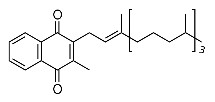
The Forgotten Vitamin
We generally hear a lot about the superstars of the vitamin world like vitamin c, e, and d, but rarely do we see this vitamin make the headlines. Come to find out this nutrient is a very powerful antioxidant that is critical to so many functions that deficiencies can be life threatening.
What we call vitamin k has two natural forms:
Vitamin K1 (phylloquinone).
Vitamin K2 (menaquinone).
They are fat soluble vitamins with the following benefits:
- Preventing calcification of coronary arteries
- Important for preventing osteoporosis by regulating calcium
- Diets high in vitamin k may help prevent stroke
- Inhibits the inflammatory cytokine IL6
- Sufficient levels are important for preventing Alzheimer’s disease
- Necessary for proper blood sugar regulation
- More powerful an antioxidant than vitamin e or coenzyme q10
- Protects the liver from free radicals
- Possibly protective against some forms of cancer
- Keeps calcium in bones and prevents calcium from being deposited in other tissues
Vitamin K Deficiency
This was thought to be rare, and it may be in a strictly clinical sense. However as we’ve seen before sub clinical deficiency of this vitamin may be widespread. There is a huge difference between deficiency that causes outright disease, and lower than optimal amounts of a vitamin that can result in long term problems that develop over time and cause chronic disease.
Some of the signs of deficiency are:
- Nosebleeds
- Bleeding Gums
- Heavy menstrual bleeding
- Eye hemorages
- Prolonged clotting times
- Osteoporosis
- Ostepoenia
- Anemia
- Easy bruising
- Hypercaliciuria
- Liver cancer
- Calcification of soft tissue
Daily requirements:
RDA’s for vitamin k are: 80mg/day for adult males, 65mg/day for adult women, 5mb/day for infants. However RDAs tend to be very conservative, and although we don’t know what the optimal dosage is, some studies suggest a range of 350-500 micrograms per day. There has been no toxic upper limit yet reported with vitamin k!
People that are on anticoagulants like Warfarin or Coumadin are advised to avoid sources of vitamin k and therefore will be deficient in this vitamin. This can lead to serious health problems and so these people should be monitored closely by a doctor or other health professional.
The most common way of testing for deficiency is to use the protein prothrombin as an indicator. This test is called “pro time” for short. This is usually monitored in people who are on so called “blood thinning” medications.
Even though vitamin k is a fat soluble vitamin, it is not stored in the body and is not known to be toxic even at high levels.
Vitamin K1 vs. K2:
A study published in 2004 (called the Roterdam Study) highlighted the difference between these two forms of vitamin k.
K1 is available from eating green leafy vegetables like kale, broccoli, spinach, and cabbage, but the absorption from these food sources is around 10%, which is a poor absorption rate.
K2 on the other hand is found only in fermented foods like soft cheese, natto, raw butter, kefer, fermented cod liver oil, and sauerkraut. The levels of k2 in these foods is lower than k1 is in green vegetables, however all of the k2 is absorbed by the body.
Vitamin k is much better absorbed when there is fat in the meal, and this makes a good argument for a nice salad with extra virgin olive oil!
It is also available in supplement form and my preference is Life Extension brand, Jarrow Formulas, Metagenics, ect. From online sources like Webvitamins or The Vitamin Shoppe.
The very latest research indicates that vitamin k benefits go well beyond just preventing deficiency, and can significantly improve your health across the board with levels like (350-500 mcg per day)!
References:
Pubmed: https://www.ncbi.nlm.nih.gov/pmc/articles/PMC4600246/
Cochrane Database of Systematic Reviews: Plain Language Summaries [Internet]. Vitamin K supplementation to prevent cardiovascular disease
Southeast Asian J Trop Med Public Health. 1993;24 Suppl 1:5-9.
Vitamin K deficiency.
Hathaway WE1.
Integr Med (Encinitas). 2015 Feb;14(1):34-9.
Proper Calcium Use: Vitamin K2 as a Promoter of Bone and Cardiovascular Health.
Maresz K1.
What Causes Gray Hair – Strategies To Prevent It
Tumeric Benefits for Antiaging





